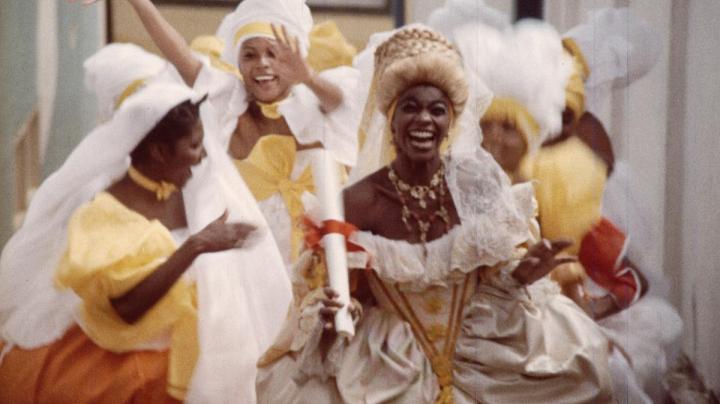Looking Back at Xica da Silva, Who Went From Slave to Brazilian Elite, On the Big Screen

Still of 'Xica Da Silva' film, 1976.
What better way to wrap up Remezcla’s celebration of Black History Month than with a look back at the life and legacy of Brazilian cultural icon, Xica da Silva, a woman born into slavery who ultimately became one of the richest and most influential Brazilians of the 18th century?
So who exactly was Xica da Silva that she defied all odds to achieve a status otherwise reserved exclusively for European settlers and their children? The historical record has provided us with a few irrefutable facts: She was born Francisca da Silva da Oliveira in the region of Minas Gerais in 1732, the mixed-race daughter of a Portuguese settler named Antonio Caetano de Sá and his African-born slave María da Silva. After changing hands between several different slave owners (and bearing a handful of children along the way), Xica ultimately became the property of a fabulously wealthy diamond mine owner named João Fernandes da Oliveira. Clearly Xica’s effect upon Fernandes was considerable, as she was soon formally freed and lived as Fernandes’ extremely well-kept, yet unofficial wife for 15 years, bearing 13 children along the way.
Xica’s atypical relationship with Fernandes was further reinforced by the fact that all of their children were formally recognized as Fernandes’ lawful progeny — something almost unheard of in relations between white settlers and their slaves. Furthermore, when Fernandes ultimately returned to Portugal, he brought their four male children along with him to occupy important posts in the royal government, leaving Xica with the entirety of his New World wealth… including a couple of slaves. By the time of her death, Xica da Silva was a member of a number of elite Social clubs, several of which were open exclusively to white members, and she was ultimately buried in a cemetery reserved for the white colonial elite.

But aside from these general biographical details, Xica da Silva has become a sort of mythical figure in Brazilian folklore, with a rather blurry line drawn between fact, embellishment, and outright fiction. It was actually a 19th-century Brazilian lawyer by the name of Joaquim Felcio de los Santos who quite unintentionally stumbled upon her story and published the first, highly dubious account of her life, in which he imagined a femme fatale-like seductress who astutely used her sexual prowess to climb the colonial social ladder.
In the early 20th century, several more highly embellished accounts of her life were published, effectively solidifying the myth of Xica da Silva as an inextricable element of Brazilian cultural identity. Yet, while she is often hailed as a symbol of Brazil’s fluid, democratic racial categories, one can’t deny the racist undertones of a figure often believed to have had an insatiable sexual appetite and an excessive taste for material opulence. However true these assessments may be, it is an unfortunate fact of colonial Brazilian history that black and mixed-race women often depended upon concubinage, marriage, or sexual relationships for the possibility of elevating their social status.
Several iconic representations of Xica da Silva have brought her image to the big and small screen alike. First was Cinema Novo pioneer Carlos Diegues‘ 1976 comedy Xica da Silva, which was based on a novel by João Felicio dos Santos. In the radical spirit of Cinema Novo, Diegues’ interpretation focused more on the greed and corruption of Portuguese colonial authorities than on Xica’s alleged hyper-sexuality. At the time, the film was one of the most successful in Brazilian history and was selected to represent Brazil at the 49th Academy Awards, though failed to pick up a nomination.
Xica da Silva (movie)
Director: Carlos Diegues
Year: 1976
A generation later, Brazilian TV network Rede Manchete adapted the story into a 1996 telenovela, Xica de Silva, written by Walcyr Carrasco and directed by Walter Avancini. The program made history by casting Taís Arajo, who became the first ever black lead in a Brazilian telenovela and went on to have an impressive career both in television and cinema. Interesting fact, the woman who played Xica’s mother was Zezé Motta, the same actress who played Xica 20 years earlier in Diegues’ feature.
Xica da Silva (novela)
Director: Walter Avancini
Year: 1996
And then, to close off with some chill Brazilian sounds, there’s Jorge Ben’s track, “Xica da Silva”, from his 1976 masterpiece África Brasil.